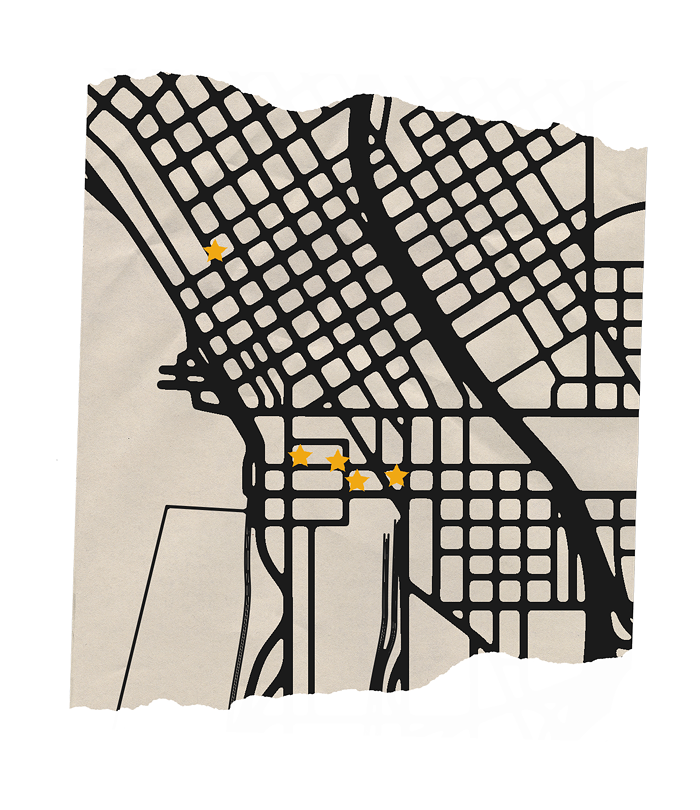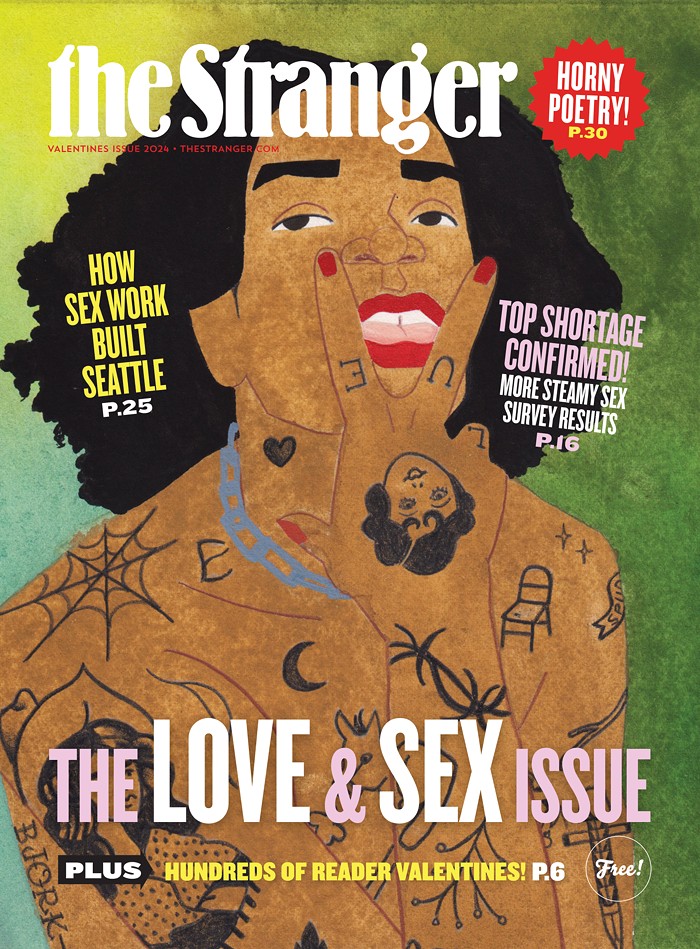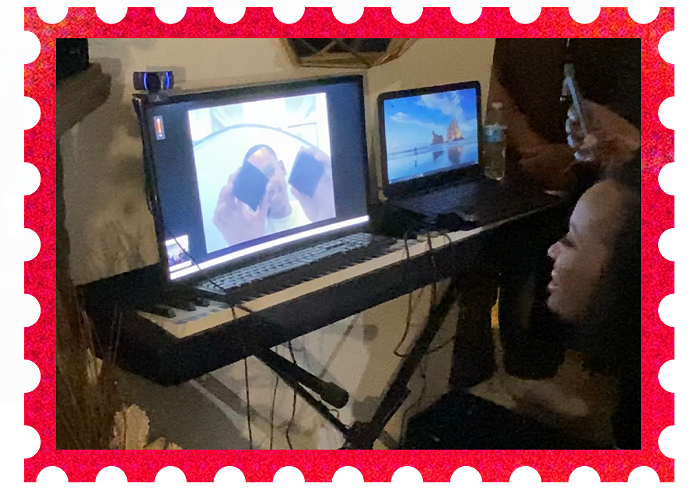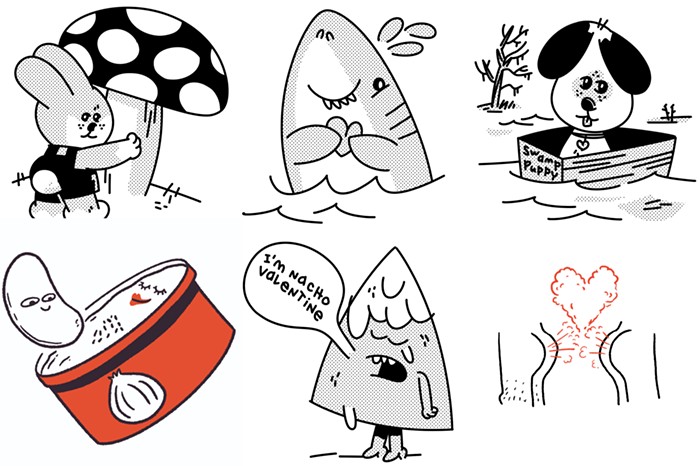I Find My Love Awake
The Ram-ifications of Breaking Your Own Rules
Love in Lockup
How I Proposed to My Wife from Prison
The Books of Love
A Poem Recommendation for Every Stage of a Relationship
Where to Pickup a Copy of The Stranger's Love & Sex Issue
It's Currently Available at Hundreds of Locations Around Seattle!
Washington Needs a Strippers’ Bill of Rights
New Proposal Reduces Fees on Dancers, Increases Security
The Stranger's Love & Sex Issue
Horny Poetry! Top Shortage Confirmed! How Sex Work Built Seattle! And Hundreds of Reader Valentines!
Take a Tour of Seattle’s Former Dens of Vice
Seattle Was Built on Sex Work—and Many of Those Buildings Are Still Standing
The Stranger’s 2024 Sex Survey Results
Orgies Slightly Up, the Binary Is Breaking, and Seattle’s Top Shortage Confirmed
Hundreds of Reader Valentines
Roses Are Red, You’re Looking Cute, One of These Love Notes May Be About You
There’s no reason that I should have spent so much time this past summer thinking about Paul and Linda McCartney. Or listening to Ram, the only record they created together before Wings officially took off. Ram is great—arguably the first whisper of indie-pop. It’s a record that beautifully combines thinly veiled insults aimed at John Lennon with prescient bedroom production that allows room for what all artists in their 30s want to do—declare grandiose plans to go off the grid, and noodle shamelessly on a riff for over five minutes.
I was wondering on this record the same way Paul hammered on “Monkberry Moon Delight,” worrying its contradictions between my fingers like a locket that wouldn’t open. And it was all because I was breaking one of my big rules and falling in love with someone I had loved before.
I was terrified, so I turned to a familiar album for comfort. I returned to Ram as I was returning to a person. It felt right, circular, symmetrical. And I was right to be terrified—I fell in love all alone, floating like Chagall’s La Mariée through a dark blue familiar sky, a solo voyager utterly lost in a universe I thought I had already mapped. Then I was rejected.
It is strange to fall in love with someone you’ve loved and lost before—more of an exercise in dismantling your carefully managed plot points—and I made a rookie mistake early on. I thought I could keep things casual. I already knew things wouldn’t work. I was older and I knew better.
This is why I had The Rule. It’s why I returned to albums, but not boys. It’s why Ram was on repeat.
Ram is a break-up album about the Beatles as much as it is a love letter to Linda and the life she and Paul would build on their little farm in the heart of the country before she passed away from cancer in 1998. Ram is an album written by a man who was swearing off his old life, all the while refusing to learn the age-old truth: everything changes, nothing remains, you cannot control who stays and who goes. He would learn that, because we all have to eventually.
I never meant to make The Rule. Someone must have asked if I would ever date an ex, and I probably laughed and said “never” or “absolutely not” or something equally as self-assured. From that baseless, brazen confidence, I can carbon date this imaginary line in the sand to somewhere in my late twenties. That’s the age when we feel we know the most, when we’ve lived just enough to have some experience, but not enough to have learned life’s relentless disregard for narrative.
I believed the rule would protect me from falling for the same wrong person, from repeating mistakes and backsliding into comfort as I am wont to do. I rewatch shows and reread books and listen to the same albums on repeat. I thought I made the rule to protect myself from the insanity of trying the same thing over and over and expecting different results.
It just protected me from growing up.
Only after breaking this rule did I learn how impossible it was in the first place. It’s impossible to fall in love the same way twice. Time had done its work. I fell in love with the weight of a shared history behind me, without the blinding sheen of a blank slate. I fell in love with who they had become, made clearer because I had loved who they had been. A love evolved more than a love regenerated.
We hold on to each other as characters so hard that we forget that the other person doesn’t just live in our head. My silly rule served a benign narcissism—it allowed me to grow and change and didn’t allow the other person to at all.
It’s all wrapped up in the idea that relationships can be gotten over, that you can truly ever wash your hands of a person when love twists threads of who we are with someone else like yarn. Love makes us adopt jokes, habits, worldviews. Loving someone helps us find our limits like puppies mouthing a hand until we bite too hard and learn what hurts. Love regenerates itself, spawning more of its terrible impulses until we go through a breakup, fall in love, move to the country, and write an album that can’t decide if it’s happy or sad, hopeful or defeated.
It’s the cosmos wrapped up in four letters, inspired by human beings. Maybe we don’t, and shouldn’t, ever get over anyone. Maybe to do that would cut us off from ourselves.
Maybe we actually can’t. Paul certainly couldn’t on Ram, he couldn’t even decide what the core of the album was. It’s his bitchy little, “See, I’m better off without you” to John, it’s the earnest outpouring of total gratitude to Linda who had picked him up off the ground and reminded him that he loved music after the Beatles dissolved into legal fights. It’s performative and personal. It’s blustering and vulnerable. It refuses to be aware of its own contradictions and depth and as a result is made deeper and more resonant. It is an album for when we are coming into adulthood and deciding that we are going to make hard and fast rules and never be made the fool again.
So I got my heart broken, and I realized I was made the fool. Not because I fell in love, but because I thought I could flatten it. I was brokenhearted, but everything felt bigger, better, more alive. I got to see the evolution in someone, I had grabbed a cosmic thread and didn’t try to thread it into a rigid pattern.
As I healed, the haze lifted, and winter closed in, I listened to a favorite album and heard it with new ears—love songs about making it up as you go, about letting go, about how silly and big life can get when we make room for all the people who can love us, hurt us, leave us, and come back new.



















